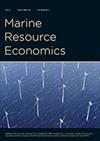尼日利亚的生物质发展和渔民的脆弱性:来自调查数据集的证据
IF 1.7
3区 经济学
Q2 ECONOMICS
引用次数: 0
摘要
生物量下降是对小规模渔业的重大威胁,但缺乏数据影响了我们了解生物量发展和渔民适应的能力。这项研究有助于在数据贫乏和面向发展的环境中采用成本效益高、基于调查数据的方法。根据尼日利亚的原始调查数据,我们发现58%的受访者认为鱼类丰度下降,特别是顶级捕食者生物量下降。然而,我们也发现了受访者战略行为的迹象。随后,我们使用多项logit和probit模型来分析生物量下降对生计的影响。我们的实证研究结果支持了我们的理论预测,即基于异质性竞争,生物量下降可能会挤出一些渔民,而净有利于其他渔民。此外,挤出状态与高度的金融脆弱性重叠。这强调生物量下降不仅影响捕鱼成本,而且可能对渔业的扶贫功能产生不利影响。本文章由计算机程序翻译,如有差异,请以英文原文为准。
Biomass Development and Fishers’ Vulnerability in Nigeria: Evidence from a Survey Dataset
Biomass decline is a vital threat for small-scale fisheries, but lack of data affects our ability to understand both biomass development and fishers’ adaptation. This study contributes to the literature on cost-effective, survey-data-based methods in data-poor and development-oriented settings. Based on original survey data from Nigeria, we find that 58% of respondents perceive a decline in fish abundance, in particular top-predator biomass. However, we also find signs of strategic behavior by respondents. Subsequently, we use multinomial logit and probit models to analyze the consequences of biomass decline for livelihoods. Our empirical findings support our theoretical prediction that biomass decline may crowd out some fishers while net favoring others, based on heterogeneous competitiveness. Furthermore, crowding-out status overlaps with high financial vulnerability. This emphasizes that biomass decline not only affects the cost of fishing, but may also adversely affect the fisheries pro-poor functions.
求助全文
通过发布文献求助,成功后即可免费获取论文全文。
去求助
来源期刊

Marine Resource Economics
农林科学-渔业
CiteScore
4.30
自引率
10.30%
发文量
25
审稿时长
>12 weeks
期刊介绍:
Marine Resource Economics (MRE) publishes creative and scholarly economic analyses of a range of issues related to natural resource use in the global marine environment. The scope of the journal includes conceptual and empirical investigations aimed at addressing real-world oceans and coastal policy problems. Examples include studies of fisheries, aquaculture, seafood marketing and trade, marine biodiversity, marine and coastal recreation, marine pollution, offshore oil and gas, seabed mining, renewable ocean energy sources, marine transportation, coastal land use and climate adaptation, and management of estuaries and watersheds.
 求助内容:
求助内容: 应助结果提醒方式:
应助结果提醒方式:


